- Home
- Julian Barnes
Love, Etc. Page 16
Love, Etc. Read online
Page 16
She says that daylight helps counteract depression. I say: and life is the opposite of death.
I am making her sound like some tabulating bureaucrat, I realise. It is not my intention. She is a fine and toastworthy representative of The Men Who Guess. Indeed, were it not for my loss of libido . . .
She asks me about the death of my mother. Well, what can I say? I was six at the time. She died, and then my father started taking it out on me because she’d died. Beating me up and so on. Because I reminded him of her.
Yes, I can offer the usual vignettes from the distant bourn of childhood—The Scent As She Kissed Me Goodnight, and The Way She Ruffled My Hair, and Bathnight In The Old Home— but how many are truly mine and how many purloined from the Cyclopaedia of False Memory I cannot at this juncture discern.
Dr Robb asks me how she died. In hospital, I say. Not that I saw her. One week she was taking me to school each morning and picking me up each afternoon, and the next she was being lowered into the ground. No, I didn’t see her in hospital. No, I didn’t see her laid out Looking Even More Beautiful In Death Than She Had Done In Life.
I always assumed she had died of a heart attack, of something grown-up and mysterious. The what and the why perplexed me more than the how. And when in later years I asked for details, my halibut father would merely karaoke away to the big tune of grief and abandonment. ‘She’s dead, Oliver,’ was all the Old Bastard would ever say, ‘and the best of me died with her.’ In this he was almost certainly telling the truth.
Dr Robb asked me, in the most condolent and circumlocutious way, if it was a credible hypothesis that my distant mother might have topped herself.
Things are getting serious around here, don’t you think?
Sophie The next time I got Stuart to myself, I put my plan into action.
I asked if I could talk to him, which I don’t normally ask, so that got him listening.
I said, ‘If anything happens to Daddy—’
He interrupted. ‘Nothing’s going to happen.’
I said, ‘I know I’m not a grown-up. But if anything happens to Daddy—’
‘Yes?’
‘Then will you be my Daddy?’
I watched him carefully as he thought about this. He didn’t look at me, so he didn’t see how closely I was watching. In the end, he turned to me and gave me a hug and said, ‘Of course I’ll be your Daddy, Sophie.’
It’s all perfectly clear to me now. Stuart doesn’t know he’s my father because Mummy never told him. Mum won’t admit it, to me or to him. Dad’s always treated me like his daughter, but he must suspect something, mustn’t he? That’s why he gets Down in the Dumps.
So it’s all my fault.
Stuart ‘What the fuck is this?’
Oliver was more animated than I’d seen him for quite a while. He was waving a letter in my face in a way that obviously made it impossible to see what it was. After a while he calmed down, or more likely got tired. I looked at the document.
‘It’s from the Inland Revenue,’ I said. ‘Enquiring whether you have any further sources of income apart from your employment at The Green Grocer, and whether you were in employment in the foregoing period while in receipt of benefit.’
‘I can fucking read,’ he said. ‘You might remember that I was retranslating Petrarch while you were still running a bitten forefinger beneath the lurid banalities of your daily horoscope.’
Enough of that, I thought. ‘Oliver, you haven’t been evading tax, have you? The game really isn’t worth the candle, you know.’
‘You fucking Judas.’ He stared at me, all unshaven and red-eyed and frankly not very healthy-looking. ‘You fucking denounced me.’
This was a bit rich. ‘Judas denounced Jesus,’ I pointed out.
‘So?’
‘So?’ I thought a bit, or at least pretended to think. ‘You’re probably right. Someone has denounced you. Now, let’s be practical. What do you think they could have on you?’
He assured me that he hadn’t been moonlighting while working for The Green Grocer because the said establishment was such a nickelfucking sweatshop that its employees were wrung dishcloths at the end of the working day. But it was true that previously, while claiming benefit, he had taken undeclared cash jobs: pushing flyers through people’s doors, renting videos door-to-door for some mysterious Mr Big.
‘Anyway, I’ve told you all this before.’
‘Have you? I’m not sure you have.’
‘I could have sworn I had.’ Then he sat down and his shoulders sagged. ‘Oh God, I can’t even remember who I’ve told what to any more.’
Well, this never used to bother him in the old days. He was always quite happy to tell the same old story again and again. ‘Let’s try and think about this calmly,’ I said. ‘The Revenue have certainly got something on you. But to give them their due’— Oliver groaned as I said this—‘they are really only interested in collecting the unpaid tax. They aren’t interested in the criminal side of things.’
‘Oh, great.’
‘But I think you ought to be more worried about the benefits side. They can be really nasty if they want. I wonder if the person who denounced you knows about the Benefits hotline? That could be awkward.’
Oliver groaned again.
‘And I suppose we ought to be concerned about the VAT-man as well. This bootleg video thing, that’s Customs and Excise. And they can be vicious. Powers of search and entry. Nothing they like more than breaking down your front door at five in the morning and taking up the floorboards. Let’s hope this joker doesn’t know about the VAT hotline.’
‘The fucking Judas,’ he repeated.
‘Yes, well. It probably is someone in the office. Or maybe it’s one of the other drivers. Just try and think, Oliver. Can you think of anyone who hates you?’ I asked cheerfully.
Mme Wyatt Sophie and Marie came over. Stuart arrived with them in his car. I make no comment, of course.
I have the lemon cake as always, which they like. But Sophie does not want any. She says she is not hungry. I ask her to eat to please me. She says she is too fat.
I say, ‘Where, Sophie? Where are you too fat?’
She says, ‘Here.’ She indicates her waist. I look at her waist. I do not see her fat. I only see her deficiency of logic.‘That is only because you have made your belt more tight than usual,’ I say.
Really.
Oliver I was soft-shoeing it around the house and made a rare foray into our bedroom. It’s on the top floor, offering a crane-shot of the street. Have I told you that? I expect someone has. Someone tells you everything, don’t they? You can’t keep a secret around here for a nano-second. A Judas under every cushion.
Sorry, I . . . anyway. There was this loud, pitiless whine from the mid-distance. With any luck, a genetically modified heat-seeking monster hornet coming to give me the coup de grâce. But it was something worse. The coiffeur was having his way with Mrs Dyer’s monkey-puzzle tree—no, as I watched, not the coiffeur but the boucher. Its witty fingers, noble arms, then limbless trunk were cruelly belaboured by the buzz-saw. I felt my spirits, such as they were, drain like bathwater. ‘May her monkey-puzzle flourish like the green bay’—it seems but a minute since I pronounced my plea.
Is it an omen? Who can tell? In le bon vieux tems, when we skied laughingly upon the snows of yesteryear, an omen lived up to its adjective and was ominous. The shooting star that stirred the velveteen sky, the snowy owl that perched all night in the blasted oak, the corny wolves howling from the graveyard— we may not have known what the fuck they portended, but we could see they were portents. Nowadays the shooting star is only a neighbour’s sky-rocket, the snowy owl is in a zoo, and the wolves are being retrained in howling before their release back into nature. Harbingers of doom? In our diminished kingdom, the broken mirror betokens only a resented trip to John Lewis for its replacement.
Ah well. Our signs and omens grow more local, and the distance between the portent and what it portend
s diminishes to nothing. You step in dogshit—that’s the warning and the calamity all in one! The bus breaks down, the mobile phone doesn’t work. A tree is chopped down. Perhaps it all only means what it means. Ah well.
Sophie Pig. Fat pig.
Gillian We haven’t got the radio on this morning. And we’re not speaking much since Ellie’s outburst. (What did you make of that, by the way? Wasn’t it peculiar? Where does all that resentment come from? I don’t think any of us have treated her in anything other than an honest, grown-up way.) So there’s this rather awkward silence, and when Ellie picks up her coffee mug there’s a slight clink, because the mug has lost its handle and the noise is her ring against the china. Just a quiet, occasional noise, but it sets me off down the years. Ellie isn’t married or engaged, and there doesn’t seem to be anyone around except Stuart, and their relationship seems fairly casual (maybe that’s the source of her resentment), but she wears a ring on the third finger of her left hand. I used to do that at one time, as a way of saying keep off, of not explaining things, of conjuring up an imaginary boyfriend, of defending your space when you can’t stand the sight of men for a few days. Or weeks. Or months.
Mostly it worked, and some little piece of junk you picked up from a market stall would have almost magical properties when it came to warding off unwelcome approaches. I’ve forgotten those times, of course. The times I remember are when it didn’t work. When someone put himself foursquare in front of you and just went for you. Took no notice of the ring even if you waggled it in his face. Didn’t suggest it was a ploy or anything— just refused to acknowledge it as a factor. Ignored the half-smile you put on your face to pretend you weren’t taking him seriously. Ignored whatever signals you were giving out. Just stood there and gave it his best shot. You and me, starting here, starting now, what about it? That was the implication, anyway. And each time I found it incredibly exciting. Sexy, dangerous even. I’d be acting cool but I’d be boiling underneath. Which I expect they sensed.
Don’t misunderstand me. I’m not one of those women who ‘likes to be dominated.’ The idea of a man storming into my life and taking control and sorting me out is not one of my fantasies. I’d rather sort myself out. And I don’t like bullies, or defer to them. I’m talking about something different, about that moment when someone is suddenly there, and says, without using the words, ‘It’s me. It’s you. That’s all there is to say.’ As if some vast truth is being guessed at before your eyes, and all you have to do is reply, ‘Yes, I think it’s true too.’
If it happened again I wouldn’t be waggling a piece of junk from a market stall but a band of gold I’ve worn every day for over ten years. And of course there’d be warning bells, like there always were, except this time more like ambulance sirens. But don’t we all want to hear, once again, those simple words: it’s me, it’s you. And someone waiting for the answer: yes, I think it’s true too. And things swirling in your head, half-familiar things you can’t at this point name, things to do with time and destiny and sex, and underneath, beginning to swell, some confident tune you hope will dance you away.
Here, now, there is silence, just the dab of a swab and the creak of a stool. And the gentle tap of Ellie’s ring against her mug.
Stuart I always expect to find Oliver with his face turned to the wall, but I suppose the thing about Oliver is that even if he’s ill he knows what the cliché is and does the opposite. So he was lying in bed with his back to the wall. He’s in this sort of box-room at the top of the house, with a blanket pinned across the window because obviously they haven’t had time to make curtains. There’s a bedside light with a Donald Duck lampshade.
‘Hello, Oliver,’ I said, not really sure how to pronounce even those words. I mean, if someone’s really ill, I know how to behave. Yes, I understand about depression being an illness, and all that. In theory, anyway. So I suppose I mean he’s got an illness I don’t know how to behave with. It makes me impatient, and a bit unsympathetic.
‘Hello, old “chum,” ’ he said in a vaguely sarcastic way which didn’t bother me. ‘Have you found me that unraced two-year-old yet?’
Was I meant to laugh? It’s a question with no correct answer. ‘Yes’? ‘No’? ‘I’m working on it’? So I didn’t say anything. I hadn’t brought any grapes, for that matter, or chocolates, or interesting magazines I’d finished with. I told him a bit about work. How we’d had the dent in his van beaten out. He didn’t seem to mind one way or the other.
‘I should have married Mrs Dyer,’ he said.
‘Who’s Mrs Dyer?’
‘O fickle of heart and faint of purpose . . .’ Or something like that, in a sort of low gabble. I don’t always pay full attention when Oliver isn’t sticking to the point. I shouldn’t think you do either.
‘Who’s Mrs Dyer?’ I repeated.
‘O fickle of heart and faint of purpose . . .’ And so on for a bit. ‘She lives at number 55. You once told her I had AIDS.’
A memory I hadn’t bothered with for years came back. ‘That old biddy? I thought . . .’ I thought she’d be dead by now, I was going to say. Except you don’t say ‘dead’ to people who are ill, do you? Except I don’t think of Oliver as ill. No doubt I should but I don’t. As I said.
The conversation rambled on like this, not exactly a meeting of minds. I thought both of us had probably had enough when Oliver turned on his back, like someone on their deathbed, and said, ‘So have you worked it out yet, old “chum”?’
‘Worked what out?’
Oliver giggled in a stupid sort of way. ‘The secret of a good chip butty, of course. The point, my old mucker, is that the heat of the chips melts the butter on the bread so that it runs down your wrists.’
There wasn’t much to say to that either, except that I consider a chip butty a pretty unhealthy form of sustenance. Then he grunted, as if that was enough putting on an act for one day. ‘Gillian.’
‘What about Gillian?’
‘When you were in the hotel room,’ he said, and though I’ve been in hundreds of hotel rooms since, I instantly knew the one he was referring to.
‘Yes,’ I said. My mind went back to a wardrobe door, swinging open again and again.
‘And?’
‘I’m not following you.’
Oliver gave a snort. ‘Did you think, what you saw, from your hotel window, did you think, what you saw, it happened regularly, day in, day out?’
‘I’m still not following you.’ Or rather, I was, but I didn’t want to.
‘What you saw,’ he said, ‘was done solely for your benefit. Gala performance. One matinee only. Work it out, old “chum.” ’ And with that he did the thing I hadn’t seen before and turned his face to the wall.
I worked it out. And let me say the taste was bitter. Extremely bitter.
What did I tell you? Trust leads to betrayal. Trust invites betrayal.
Oliver Impossible to avoid, de temps en temps, those Thersites moments, don’t you find? Days when you know the pustuled fool speaks true. War and lechery, war and lechery. Not to mention vanity and self-delusion. I have a new Would You Rather? by the way. Would you rather destroy yourself by lack of self-knowledge, or destroy yourself by its acquisition? You have, oh, a lifetime to ponder that one.
Ripeness is all, according to another canonical expert. We know the dream: the loamy soil, the cloud-dismaying sun, pole position on the branch, the slow concentration of flavour, that giveaway colouring of the skin, and then, oh such ripeness, that were an infant’s dimpled pinkie to prise us upward for a nano-second, the umbilical stalk from which we perpend would part so unresentfully from the branch, and we would paraglide weightlessly down onto a fortuitous clump of hay, there to lie, ripe, replete, at ease with the holy cycle of living and dying.
But most of us are not like that. We are like the medlar, which passes from indigestible hardness to umber collapse in the space of an hour, so that the hunter-gatherers who first valued it, those early organicists, those proto-Stuarts, used
to sit up through the night with tentative candle and urgent fruit net, waiting for the moment. But who watches the fruit-watcher? In our case, there is no attendant with nightlight aloft, and we snore through our blip of ripeness. Indurate middle-age the one minute, deliquescing senility the next.
Concentrate, Ollie dear, concentrate. You do so wander nowadays. Look at that trail of ox-bow lakes behind you. What does the pustuled fool proclaim?
Only this. The sad truth quickly learnt by the humblest gerbil, but taking our own dumb species the full three-score-and-ten to apprehend. That all relationships, even between two pure novice nuns—hey, especially between two pure novice nuns—are about power. Power now. And if not power now, then power later. And the sources of power are so old, so familiar, so cruelly deterministic, so simple, that they have but simple names. Money, beauty, talent, youth, age, love, sex, strength, money, more money, yet more money. The Greek shipping tycoon in the men’s room demonstrates to his chuckling compadre what the world is all about: he picks up the attendant’s tip-saucer and lays his membrum virile across it. Look no further, O ye seekers after wisdom. The Greek’s name was Aristotle, after all. And I bet he didn’t get denounced to the Benefits Hotline.
So how does all this relate to the frankly less than Shakespearean histoire or imbroglio with which you have found yourself involved? My apologies, by the way, if you think such are required. (Are they? Didn’t you, in a sense, invite yourself in? Weren’t you, in a sense, asking for it?) Merely that there was a time when Gillian’s lustre made her the cynosure of all eyes, when Ollie’s flair—I put it no higher—carried the field before him, and when Stuart, if you’ll pardon the phrase, couldn’t get any if he paid for it. And now? Now Stuart can pay for it. Now it is Stu-baby’s todger among the drachmae. You find my Weltanschauung grown simplistic? But life does simplify itself, you’ll find, its grim lineaments do expose themselves as the years progress and disappoint.

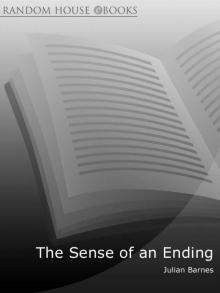 The Sense of an Ending
The Sense of an Ending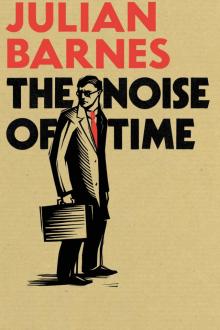 The Noise of Time
The Noise of Time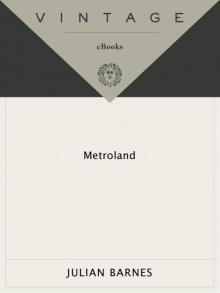 Metroland
Metroland Letters From London
Letters From London Before She Met Me
Before She Met Me Pulse
Pulse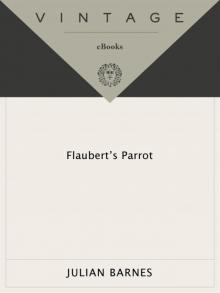 Flaubert's Parrot
Flaubert's Parrot England, England
England, England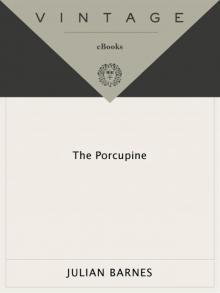 The Porcupine
The Porcupine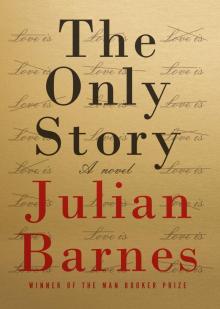 The Only Story
The Only Story Love, Etc
Love, Etc Through the Window: Seventeen Essays and a Short Story
Through the Window: Seventeen Essays and a Short Story Staring at the Sun
Staring at the Sun Cross Channel
Cross Channel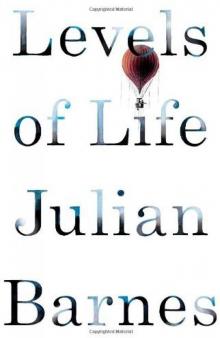 Levels of Life
Levels of Life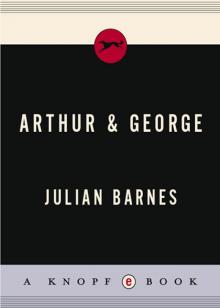 Arthur & George
Arthur & George Love, Etc.
Love, Etc. A History of the World in 10 1/2 Chapters
A History of the World in 10 1/2 Chapters Something to Declare
Something to Declare Through the Window: Seventeen Essays and a Short Story (Vintage International)
Through the Window: Seventeen Essays and a Short Story (Vintage International)